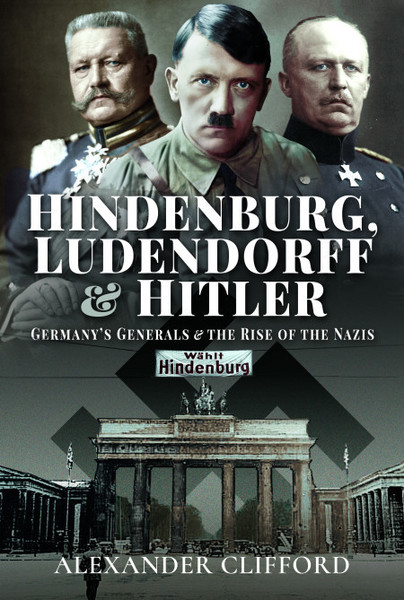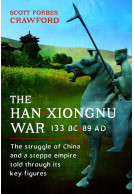Hindenburg, Ludendorff and Hitler (Hardback)
Germany's Generals and the Rise of the Nazis
Imprint: Pen & Sword Military
Pages: 368
ISBN: 9781526783332
Published: 26th November 2021
(click here for international delivery rates)
Need a currency converter? Check XE.com for live rates
| Other formats available - Buy the Hardback and get the eBook for £1.99! | Price |
|---|---|
| Hindenburg, Ludendorff and Hitler ePub (28.6 MB) Add to Basket | £6.99 |
They are two of twentieth-century history’s most significant figures, yet today they are largely forgotten – Paul von Hindenburg and Erich Ludendorff, Germany’s First World War leaders. Although defeat in 1918 brought an end to their ‘silent dictatorship’, both generals played a key role in the turbulent politics of the Weimar Republic and the rise of the Nazis.
Alexander Clifford, in this perceptive reassessment of their political careers, questions the popular image of these generals in the English-speaking world as honourable ‘Good Germans’. For they were intensely political men, whose ideas and actions shaped the new Germany and ultimately led to Hitler’s dictatorship.
Their poisonous wartime legacy was the infamous stab-in-the-back myth. According to the generals, the true cause of the disastrous defeat in the First World War was the betrayal of the army by politicians, leftists and Jews on the home front. This toxic conspiracy theory polluted Weimar politics and has been labelled the beginning of ‘the twisted road to Auschwitz’.
Hindenburg and Ludendorff’s political fortunes after the war were markedly different. Ludendorff inhabited the far-right fringes and engaged in plots, assassinations and conspiracies, playing a leading role in failed uprisings such as Hitler’s 1923 Beer Hall Putsch. Meanwhile Hindenburg was a vastly more successful politician, winning two presidential elections and serving as head of state for nine years. Arguably he bore even more responsibility for the destruction of democracy, for he and the nationalist right he led sought, through Hitler, to remould the Weimar system towards authoritarianism.
There are some books that come along that you just want to dive into and this was one of them. I’ve long been learning about the First World War & the Second World War but often some of the most fascinating places in history is the ‘in between’ wars section and this particular part of history is fascinating as Alexander Clifford explores a part of that history, Hindenburg, Ludendorff & Hitler. The period of the Weimar Republic was basically 10 wasted years where life in Germany just festered and all the surrounding upheaval was no surprise that a mangled relationship between these three men would sow the seeds for another global conflict.
The History Fella
Although in my opinion, Hitler has to carry the can for this relationship and what would eventually happen, it was very much interesting reading about the relationship, conflict and suspicion between these three, it really does enlighten the reader as to how things went wrong and in a way shows clearly who was the aggressor, the yes man and the fooled in this bad political relationship. This has been a fascinating read, comprehensive, detailed and very well written and with all the other characters in the book would in other world’s make a really good thriller. From beginning to end this was a really good book, I would have no other choice but to recommend this book and if you want to learn about the relationship between these three men, this is one of the best books I have read on this subject.
Read the full review here
As featured in
The Western Front Association
This is a book that will intrigue and interest many, from those who have an interest in the key German Generals from the Great War, Hindenburg and Ludendorff, alongside the continued fascination for so many with the early days of instability of the Weimar Republic. At the same time, it will interest anyone who seeks to learn more about that movement of Adolf Hitler at this time. It provides a German history as much as a military one and a tale of German political history.
Jon Sandison
Until I read this book, I had no idea how precarious the political situation was in Germany. After reading about the conditions in the 20s and 30s, it is more understandable how Hitler rose to power. This book definitely filled a gap in my knowledge of WWII era history.
NetGalley, John Purvis
A well-considered book that had me stopping and thinking every few pages and researching on the internet; I’m going to run to 4.5 anchors. This book really added to my awareness of the events that led to Hitler and the Nazis’ rise to power, but has left me with plenty more questions.
ARRSE (Army Rumour Service)
Read the full review here
Germany's Generals and the Rise of the Nazis is no mere political history; it is above all a
Jack Arscott, Institute of Modern Languages Research, University of London
human history, narrated by an author with an eye for an illuminating anecdote. Drawing on his
capacious knowledge of the Weimar political scene, Clifford deftly marshals a rich, and
occasionally startling, array of source material to produce a compelling reappraisal of the
under-appreciated role of the military in the disintegration of Germany's first democracy that
rises above purely events-based accounts in its keenly observed psychological portrayals of the
megalomaniacal men behind their martial masks.
A very concise and well researched book on the three leading figures during world war 1 at Germany's after effects of their parts in the war looking at how their personality and skills were put to use for better or worse. A very compelling read.
NetGalley, Lional Jones
Weimar-era Germany was a confusing place: foreign occupation, hyperinflation, putsches, and armed paramilitaries clashing in the streets.
James Dittes, Goodreads
It remains so.
Which is why Clifford's book, Hindenburg, Ludendorff and Hitler is such a welcome, timely account of how German's first Republic was murdered in the crib. And while Hitler's name may be the most familiar of the titular trinity, Clifford lays the burden on the backs of Hindenburg and Ludendorff. For many non-German readers, Hitler bursts into history as a son of god (or a demon). Clifford ties in Hindenburg as the father of the Third Reich, and Ludendorff as its racist, delusional Zeitgeist.
Hindenburg and Ludendorff's legends were made in the Great War. They were the leader and the tactician behind German success against the armies of the Russian Empire in the Eastern Front, most notably at the Battle of Tannenberg, a five-day entrapment in the first month of the war (August 1914) that crushed two Russian armies and proved the mobility of the Germany military.
But the subsequent rise of Hindenburg and Ludendorff to the top ranks of the German military left them responsible for the collapse of Germany armies four years later in the Western Front. Propaganda-saturated Germans never saw the sudden end coming, especially mere months after Operation Michael came close to encircling Paris before American troops poured in and reversed all advances. Ludendorff suffered a mental breakdown and resigned. Hindenburg hung on through Armistice, all the while trying to avoid responsibility for such an ignominious defeat.
Clifford shows how, in the years following the war, as Germany's socialist SPD-led Republic emerged and the country faced a bleak future enschackled by the Versailles Treaty, both generals nourished the Dolchstoss, "stabbed-in-the-back conspiracy theory" for quite personal reasons. Ludendorff, once he had his wits about him, turned into a General-Michael-Flynn-style conspiracy monger, roving from coup attempt to coup attempt until he was arrested in the Nazis' Beer Hall Putsch (1923). But 1927, Hitler would dispatch him, and he would spend the rest of his life peddling paganism along with anti-Christian as well as anti-Semitic screeds.
Hindenburg is Clifford's primary target here, as his capitulation to the Nazis in the waning days of his life has often been explained away by his old age and subsequent death from lung cancer.
"President Hindenburg," Clifford writes, "was the ultimate arbiter of German politics in this period and it was his decisions more than anyone else's that ultimately led the country down a dark path that would end with war and genocide."
Hindenburg, already 70 at the end of the war, bided his time after the Versailles Treaty, burnishing his reputation. In 1925, after candidates failed to win a first round in the presidential elections, he threw his hat into the ring as a candidate for the right-wing, German People's Party (DVP). Seen as a non-partisan, unity figure, he won election to a post from which--due to constitutional provisions--he could exert great pressure on the parliamentary process.
A key element of the Dolchstoss excuse was that socialists and Jews had lost the war, not Gemany's vaunted army--certainly not a patriotic field marshal like Hindenburg. As president, Hindenburg ignored the SPD, preferring to work with the moderate-Catholic Center Party, despite the fact that the SPD was the nation's largest party. Nevertheless, the SPD gave him full support for re-election, spooked as they were by mounting sectarian violence by Nazis and Communists. Despite this support and the opposition of his principal opponent, Adolf Hitler, Hindenburg, aged 85, devoted his final term to the cause of "unite the right" selecting a series of chancellors over mounting Reichstag opposition, until he came to the despot he had once described as "that lance corporal."
Hitler's rise, first to chancellor, then to Fuehrer, was not so much manipulated from the dying Hindenburg as handed him on a silver platter. The vision of one-party, right-wing rule which Hitler embodied was, Clifford shows, the very one envisioned by Hindenburg.
There is one surprise worth reading to the end to learn--it regards Hindenburg's political "will," which was passed directly to Hitler after his death. It surprised me so much, I wanted to throw my e-reader at the wall!
The timeliness of reading this book, even as the American Republic reels in the wake of attacks by Donald Trump, "Unite the Right" nationalists, and organized separatists, cannot be understated. It is a chilling, fascinating look at history.
Special thanks to NetGalley & Pen & Sword Press for providing me with this advanced galley in return for an honest review.
Whilst many people have an outline of how Hitler gained power, the real story sits in the failure of Weimar politics and the central role of Hindenburg in conducting events. The author has delivered an excellent narrative of the events from 1918 to 1933 and the story is detailed and explains how Ludendorff and Hindenburg played their very different parts. It is not another ‘Hitler’ book and it is right that the two generals dominate the story. In the end of course global economic collapse provides the route to dictatorship and the problems that follow. Given the inability of the Weimar system to deal with its moribund inertia it is not surprising that voters sought relief in extreme solutions.
Michael McCarthy
I was leading a group in Munich studying German history in the Weimar period; it was the day after Lehman Bros collapsed and it seemed that the global economic system would also collapse. All of the participants agreed that if an apparent ‘saviour’ emerged promising to restore their incomes, assets and jobs they would likely support him. Plus ca change?
Michael McCarthy. Battlefield Guide
About Alexander Clifford
Alexander Clifford is a historian who has studied at the universities of Leeds, Munich and Northumbria, and is an expert on Europe in the interwar period and has made a particular study of the Spanish Civil War. His previous publications include The People’s Army in the Spanish Civil War: A Military History of the Republic and International Brigades 1936-1939 and Fighting for Spain: The International Brigades in the Civil War 1936-1939.

















